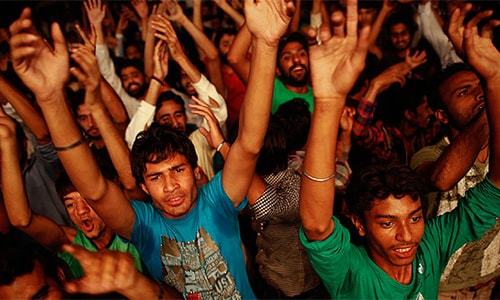An interesting development is taking place amongst the electorate in Attock. Apparently, the voters in the area have managed to rid themselves of the influences of dogmatic political movements, which have for years based their narrative on radical notions and preyed on the sentiments of a conservative populace.
Individual voters, when asked, contend that they would rather vote for candidates of their choosing than follow instructions — most of which are based around religious and tribal groupings. No longer does the average voter feel compelled to vote based on sectarian lines, or under pressure from his or her clan — or community.
The district of Attock in Punjab, was until recently, a hotbed of radical thought and there were several terror attacks in the area. But the situation has improved on the security front.
Much thanks to the counterterrorism operations following the unfortunate and tragic assassination of the home minister of Punjab, retired Colonel Shuja Khanzada, in 2015.
His son, Jehangir Khanzada, is running for the provincial assembly seat on a Pakistan Muslim League-Nawaz (PML-N) seat. Quite surprisingly he travels in the district without any security.
“We had serious terrorism going on here, but we must all appreciate and congratulate law enforcement and other security agencies for eradicating a very real threat,” said Jehangir Khanzada.
He went on to say that banned groups — including the Sipah-i-Sahaba — cannot be allowed to operate with impunity, while legitimate politicians have to take all kinds of precautions.
But many of those who intend to vote for Mr Khanzada are quite openly supporting the Pakistan Tehreek-i-Insaf’s (PTI) candidates for the National Assembly (NA) seats.
Not everyone agrees with that perplexing reality though. Ali Asghar, a councillor in the Ghurghusti township near Hazro, is one of them.
“We must follow party lines, and decide who to vote for.”
However, candidates who are set to benefit from the shift in how people are deciding to vote this time, obviously have no complaints. Retired Major Tahir Sadiq, PTI’s candidate for the NA seat, has welcomed the changing attitude of the people, and called it a part of democratic development.
Syed Yawar Bukhari, the PTI’s candidate for the provincial seat of PP-1 Attock city, had a similar opinion.
“Voters must elect persons who are not only fair in their dealings, but are also approachable and available to them after the elections. That is why a large contingent of ex-Sipah Sahaba workers have decided to support me.”
Yawar Bukhari is a relative of Zulfi Bukhari — close friend and confidant of Imran Khan, the party’s chairman. Yawar’s uncle, Syed Ijaz Bukhari, was elected to the provincial assembly from the same constituency in 2013.
The decisive votes in PP-1 come from three cantonments in the constituency: Attock, Kamra and Sanjwal. Both PTI candidates, Yawar Bokhari and Mr Sadiq, are confident of bagging a significant number of votes from the cantonments.
Mr Sadiq is running on a PTI ticket for two NA seats, NA-55 and NA-56. Much of his campaign is based on the confidence that he will be able to materialise on the PML-N’s perceived weaknesses in the area.
There are influential political groups in the district. Most of them are stronger than political parties themselves, and many of these groups form alliances to make larger groups — in this election, forming the largest: the ‘Tahir Sadiq group.’ Yawar Bukhari agrees with the assessment, and claims that the PTI not only has support from the workers of the party, but also from political groupings in the district.
Attock is home to controversial — and in the case of one Khadim Hussain Rizvi, eccentric — political and religious leaders. The radical cleric is a new player in the game, but he has managed to mobilise the Barelvi community, which includes custodians of shrines and their followers. Other sects, including the Shia and the Deobandis, remain powerful actors however.
The major candidates
In prior elections, the district had three NA seats, which have now been reduced to two — NA-55 and NA-56. Shaikh Aftab Ahmad of the PML-N — who was elected to the NA in the last two elections, 2008 and 2013 — is running in the constituency NA-55 (Attock, Hazro, Hassanabdal).
The seasoned PML-N politician is going up against the PTI’s Tahir Sadiq. Mr Sadiq finished third with 50,878 votes to the 59,638 votes of the winner — Shaikh Aftab Ahmad.
The PTI has trusted Tahir Sadiq with two seats, and he is their candidate for NA-56 (Jand, Fateh Jang, Pindi Gheb) as well.
The PML-N’s Malik Sohail Khan — who was the PTI’s candidate in 2013 — will be leading the charge against him. Neither of the two had won the seat back then however, as it was Malik Aitebar Khan who won with a PML-N ticket. This time though, he’s running as an independent, which will only dent the PML-N’s vote bank.
Malik Sohail’s bid is not off to the greatest of starts. Asif Ali Malik, a resident of Pindi Gheb, and the PML-N’s candidate for the area in the previous elections has been asked to run in the PP-3 constituency, which is farther away, dampening any possible support he could offer to Malik Sohail in his run. Asif Malik is also the brother-in-law of Chaudhry Nisar, a former senior leader of the PML-N.
To make matters even worse for Malik Sohail, the Tehreek-i-Labbaik Pakistan (TLP) is also in the running, with Syed Faisal Mehmood going up against him. The TLP and its leaders are notoriously against the PML-N. Furthermore, both the Muttahida Majlis-i-Amal and the Majlis Wahdatul Muslimeen have extended support to the PTI.
Published in Dawn, July 21st, 2018












































